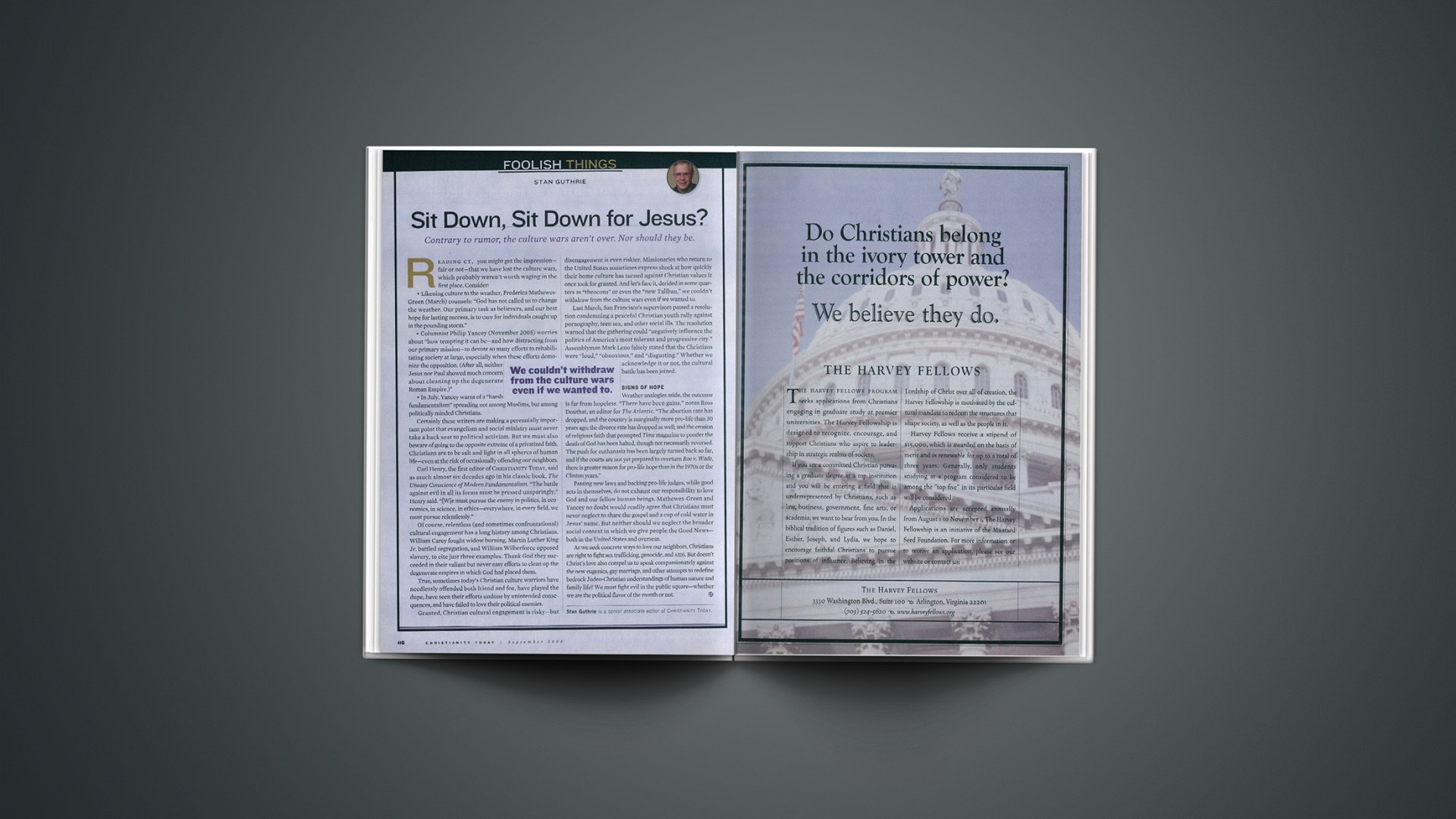Reading CT, you might get the impression—fair or not—that we have lost the culture wars, which probably weren’t worth waging in the first place. Consider:
• Likening culture to the weather, Frederica Mathewes-Green (March) counsels: “God has not called us to change the weather. Our primary task as believers, and our best hope for lasting success, is to care for individuals caught up in the pounding storm.”
• Columnist Philip Yancey (November 2005) worries about “how tempting it can be—and how distracting from our primary mission—to devote so many efforts to rehabilitating society at large, especially when these efforts demonize the opposition. (After all, neither Jesus nor Paul showed much concern about cleaning up the degenerate Roman Empire.)”
• In July, Yancey warns of a “harsh fundamentalism” spreading not among Muslims, but among politically minded Christians.
Certainly these writers are making a perennially important point that evangelism and social ministry must never take a back seat to political activism. But we must also beware of going to the opposite extreme of a privatized faith. Christians are to be salt and light in all spheres of human life—even at the risk of occasionally offending our neighbors.
Carl Henry, the first editor of Christianity Today, said as much almost six decades ago in his classic book, The Uneasy Conscience of Modern Fundamentalism. “The battle against evil in all its forms must be pressed unsparingly,” Henry said. “[W]e must pursue the enemy in politics, in economics, in science, in ethics—everywhere, in every field, we must pursue relentlessly.”
Of course, relentless (and sometimes confrontational) cultural engagement has a long history among Christians. William Carey fought widow burning, Martin Luther King Jr. battled segregation, and William Wilberforce opposed slavery, to cite just three examples. Thank God they succeeded in their valiant but never easy efforts to clean up the degenerate empires in which God had placed them.
True, sometimes today’s Christian culture warriors have needlessly offended both friend and foe, have played the dupe, have seen their efforts undone by unintended consequences, and have failed to love their political enemies.
Granted, Christian cultural engagement is risky—but disengagement is even riskier. Missionaries who return to the United States sometimes express shock at how quickly their home culture has turned against Christian values it once took for granted. And let’s face it, derided in some quarters as “theocons” or even the “new Taliban,” we couldn’t withdraw from the culture wars even if we wanted to.
Last March, San Francisco’s supervisors passed a resolution condemning a peaceful Christian youth rally against pornography, teen sex, and other social ills. The resolution warned that the gathering could “negatively influence the politics of America’s most tolerant and progressive city.” Assemblyman Mark Leno falsely stated that the Christians were “loud,” “obnoxious,” and “disgusting.” Whether we acknowledge it or not, the cultural battle has been joined.
Signs of Hope
Weather analogies aside, the outcome is far from hopeless. “There have been gains,” notes Ross Douthat, an editor for The Atlantic. “The abortion rate has dropped, and the country is marginally more pro-life than 30 years ago; the divorce rate has dropped as well; and the erosion of religious faith that prompted Time magazine to ponder the death of God has been halted, though not necessarily reversed. The push for euthanasia has been largely turned back so far, and if the courts are not yet prepared to overturn Roe v. Wade, there is greater reason for pro-life hope than in the 1970s or the Clinton years.”
Passing new laws and backing pro-life judges, while good acts in themselves, do not exhaust our responsibility to love God and our fellow human beings. Mathewes-Green and Yancey no doubt would readily agree that Christians must never neglect to share the gospel and a cup of cold water in Jesus’ name. But neither should we neglect the broader social context in which we give people the Good News—both in the United States and overseas.
As we seek concrete ways to love our neighbors, Christians are right to fight sex trafficking, genocide, and aids. But doesn’t Christ’s love also compel us to speak compassionately against the new eugenics, gay marriage, and other attempts to redefine bedrock Judeo-Christian understandings of human nature and family life? We must fight evil in the public square—whether we are the political flavor of the month or not.
Stan Guthrie is a senior associate editor of Christianity Today.
Copyright © 2006 Christianity Today. Click for reprint information.
Related Elsewhere:
Christianity Today articles mentioned in this column include:
The Lure of Theocracy | As we flee decadence, we must watch where we step. By Philip Yancey (July 10, 2006)
Exploring a Parallel Universe | Why does the word evangelical threaten so many people in our culture? By Philip Yancey (Nov. 3, 2005)
Loving the Storm-Drenched | We can no more change the culture than we can the weather. Fortunately, we’ve got more important things to do. By Frederica Mathewes-Green (March 3, 2006)
Other articles mentioned include:
Theocon Moment | Needed: More Sam Brownbacks, fewer Pat Robertsons. By Ross Douthat (Wall Street Journal, April 9, 2006)
Evangelical teens rally in S.F. | More than 25,000 evangelical Christian youth landed Friday in San Francisco for a two-day rally at AT&T Park against “the virtue terrorism” of popular culture, and they were greeted by an official city condemnation and a clutch of protesters who said their event amounted to a “fascist mega-pep rally.” (San Francisco Chronicle, March 25, 2006)










